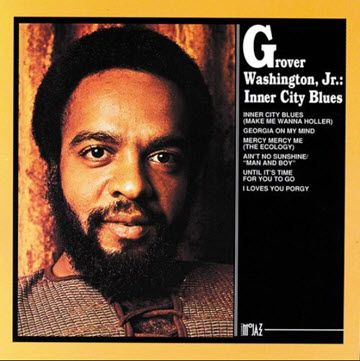One of the most significant and underrated musical figures of the 20th century is finally getting the recognition he deserves. We’re talking Gil Scott-Heron, and with the remastered 3-CD compilation The Revolution Begins -The Flying Dutchman Masters music fans who have come to him lately via the 2010 album I’m New Here can immerse themselves in some of the most meaningful soul/jazz music ever recorded. Gil was a notable up-and-coming black poet in 1970 when he was introduced to Bob Thiele, who ran Flying Dutchman records, and the first take on recording any of these works was in spoken-word format. The killer track on that seminal album Small Talk at 125th & Lenox, of course, was “The Revolution Will Not Be Televised”, and suddenly Gil found his true calling: the marriage of revolutionary poetic lyrics with jazz. Three recordings for Flying Dutchman were issued in all, and every one of those 49 tracks is included in this compilation.
Key tracks: the two versions of “The Revolution Will Not Be Televised”, “Lady Day and John Coltrane”, “Whitey On The Moon”, “Home Is Where The Hatred Is” (an absolutely superb track!) and “Get Out Of The Ghetto Blues” (oh man, this guy could set a mood just as deep and soulful as any top r & b crooner), and a dozen or more others that will by turns inspire, exalt, and persuade you that this man’s work will continue to be current and vital for decades to come.
To call this collection “essential” is understating the case. In fact, Scott-Heron’s work was the embodiment of everything that black politics and black music stood for in the last half of the 20th century. What Sam Cooke began with “A Change Is Gonna Come”, and what Marvin Gaye continued with “What’s Going On?” provided a firm foundation for the message and the inherent musicality behind the achievements of Gil Scott-Heron. These songs portray the sordid truths behind the struggle for equality, life in the ghetto, the temptations of drugs and crime, gender equality and, overwhelmingly, the sadness behind the lives of black men in ways that no other artist has ever equaled. Gil was a modest man, but fully aware of his own achievements, and brutally honest about the current state of music when he said, regarding hip-hop artists generally,
“They need to study music. I played in several bands before I began my career as a poet. There’s a big difference between putting words over some music, and blending those same words into the music. There’s not a lot of humor. They use a lot of slang and colloquialisms, and you don’t really see inside the person. Instead, you just get a lot of posturing.”
Scott-Heron was a brilliant writer, a competent singer, and a persuasive spokesman for his generation. He was also a multi-genre master, performing jazz, rap and funk with equal visceral impact. And he was writing his own lyrics from the inside, having experienced both drug addiction and incarceration. Moreover, his talents attracted some of the most exciting musicians around – the brilliant drummer Bernard Purdie, bassist Ron Carter, sax genius Hubert Laws, and Brian Jackson on piano, the last of whom he credited for lifting his poetry to musical heights not seen since Marvin Gaye. Scott-Heron had an expansive, driven and political mind fused with great musical intelligence. He was as familiar with the writings of Malcolm X as he was with the music of John Coltrane. His special gift was to bring focus and fusion to all of these disparate elements. From beginning to end, he stayed true to his mission, so well stated in his first major achievement, the first verse of which is quoted below:
The Revolution Will Not Be Televised
You will not be able to stay home, brother.
You will not be able to plug in, turn on and cop out.
You will not be able to lose yourself on skag and skip,
Skip out for beer during commercials,
Because the revolution will not be televised.
We recommend this album without reservation to anyone who cares about music, politics, culture, racial relations, poetry, art, hip-hop and blues. By the way, Scott-Heron’s own term for himself was “bluesologist”,which he defined as “a scientist who is concerned with the origin of the blues”. And it must be said that every current hip-hop artist should be listening to this material: The Revolution Begins sets the bar far higher than any current performer dares to reach.



